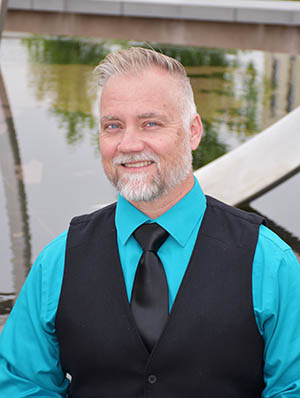Brian D. Sharp, PhD, CCC-SLP
ASSISTANT PROFESSOR
Dr. Brian Sharp is a full-time assistant professor of Communication Sciences and Disorders in the School of Allied Health Professions at Loma Linda University. He has been teaching at Loma Linda University since 2004. His clinical experience includes all populations from infant to the geriatric population in a variety of settings which include inpatient acute, acute rehabilitation, outpatient, skilled nursing, home health, and hospice.
Dr. Sharp teaches graduate courses in the areas of adult language disorders, motor speech disorders, traumatic brain injury/cognition, and infant/pediatric dysphagia. In addition to teaching, Dr. Sharp serves as a clinical instructor for the departments first year graduate student medical rotation. He also provides research mentoring of graduate and doctoral students. In 2014 Dr. Sharp was awarded the Outstanding Research Award for Loma Linda University, School of Allied Health Professions.
Outside of the department, Dr. Sharp is Chair of Clinical Coordinators for the School of Allied Health Professions and Co-Chair of Interprofessional Education for the School of Allied Health Professions. Dr. Sharp also serves as a visiting adjunct faculty for the Harvard Macy Institute Program for Healthcare Educators at Harvard Medical School where he provides training on supervision and communication styles. Dr. Sharp has also been active in professional advocacy having served in various positions on the Board of Directors for the CSHA for 16 years. In 2007, Dr. Sharp was awarded the California Speech Language and Hearing Association (CSHA) District 10 Service Award. In 2012 he was awarded the Fellows Award for the California Speech Language Hearing Association.
Dr. Sharp is also passionate and invested in service learning and participates in developing infant/pediatric dysphagia and neurorehabilitation programs as part of the CMSD China service-learning program.
Areas of professional interest include, neurorehabilitation, psychoneuroimmunology (Mind/Body studies), education and healthcare mindfulness/wellness (stress/depression/quality of life), and communication styles for the purpose of improving learning.
EDUCATION
- PhD, Rehabilitation Sciences, Psychoneuroimmunology/Aphasiology, Loma Linda University.
- M.S., Communication Disorders, University of Redlands
- B.S., Communication Disorders, University of Redlands
PROFESSIONAL CERTIFICATES
- 2019 – Certification in Emotional Intelligence Training, Talent Smart.
- 2017 – Certification in Healthcare Education, Program for Educators in Health Professions, Harvard Macy Institute, Harvard Medical School.
- 2009 – Certification in Mindfulness Based Stress Reduction (MBSR), University of Massachusetts Medical School
- 1998 – Paneled clinician in speech-language pathology for California Children Services.
- 1996 – Certification in Neonatal Oral Motor Assessment Scales,
- 1995 - Certificate of Clinical Competence in Speech-Language Pathology, American Speech-Language Hearing Association, #09125649
- 1995 – License in Speech Pathology, State of California, #9812
RESEARCH EXPERIENCE
RESEARCH PRESENTATIONS
- May 2019 - “Communication Styles.” Harvard Macy Institute/Harvard Medical School, Health Educators Course, Boston MA.
- November 2018 - “The Role of the SLP in the Rehabilitation Setting.” Loma Linda University to Visitors from DongE Rehabilitation Hospital, DongE China.
- September 2018 - “Neurological Communication Disorders.” DongE Rehabilitation Hospital, DongE, China:
- September 2018 - “Swallowing Disorders.” DongE Rehabilitation Hospital, DongE, China
- September 2018 - “The Identification and Management of Feeding and Swallowing Disorders.” International Gastrointestinal Conference, Hangzhou, China
- May 2018 - “Communication Styles.” Harvard Macy Institute/Harvard Medical School, Health Educators Course, Boston MA.
- November 2017 – “Aphasia Rehabilitation: Looking Beyond the Language Disorder.” American Speech Language Hearing Association Annual Conference.
- September 2017 - “Assessment and treatment of pediatric swallowing disorders.” Zeijang University Childrens Hospital, Hangzhou, China
- May 2017 - “SOS…Help: Using Formative Dialogue to Improve Teaching.” Harvard Macy Institute – Harvard Medical School
- March 2017 - “Let’s Collaborate CSHA’s Interprofessional Relationships with Our National and State Related Organizations.” California Speech Language Hearing Association Annual Conference;
- November 2016 – “The Effects of Stress in Aphasia Therapy.” American Speech Language Hearing Association Annual Conference;
- July 2014 – “Wholeness Integration, the Dilemma of Application Within the Community.” 2nd Global Conference on Health and Lifestyle in Geneva Switzerland
- October 2013 - “Supervision and Mentoring: It’s Not as Hard as You Think.” Hallmark Rehabilitation.
- September 2013 - “Supervision and Mentoring: It’s Not as Hard as You Think.” Jurupa Unified School District
- July 2013 –“Supervision and Mentoring: It’s Not as Hard as You Think.” Oakland Unified School District
- April 2008 - “Evidence Based Dysphagia Research: Translation to Clinical Practice.” CSHA State Conference
PUBLICATIONS
PEER REVIEWED PUBLICATIONS
- Sharp, B. (2019). The Mind Body Connection: Using Psychometric Measures to Determine Therapy Intensity. Manuscript submitted for Publication.
- Sharp, B., Schmude, M. (2019). Implementing Collaborative Learning Methods. Harvard Macy Institute Research Blog. June 2019
- Sharp, B., Little K. (2015). SLP Shortages…Getting to the Root of the Problem. California Speech Language Hearing Association Quarterly, Spring 2016
- Sharp, B. (2013). Stress, Depression, Quality of Life, and Language Recovery in Constraint Induced Aphasia Therapy (CIAT). ProQuest Dissertations Publishing, 86 pages; 3566137
- Sharp, B., Shaughnessy, P., Berk, L., Daher, N. Stress and Language Recovery in Individuals with Aphasia: Constraint Induced Language Therapy. Physical Therapy Rehabilitation Science, 2 (2), 92-98.

